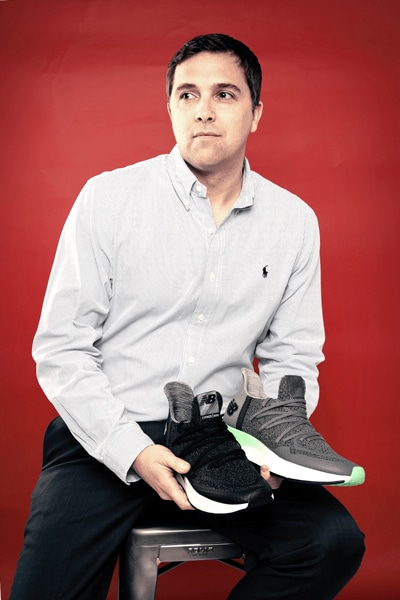Finally, the package arrives. You open the box, peel back crisp paper, and remove a new pair of shoes. The style is on point. The quality is high—although something seems off. And then you glance at the heel. It doesn’t say “New Balance.” It says “New Bunren.”
The Chinese retail world has spawned a new class of copycats. A step beyond run-of-the-mill counterfeiters who’ve churned out low-cost imposters for decades, these new, sophisticated imitators don’t simply clone products; operating under the guise of suspiciously derivative names, they lift the entire brand outright.

Senior Counsel, IP and Global Brand Protection
New Balance Courtesy of New Balance
“They essentially make exact replicas. They copy the shoe. They copy the silhouette. They copy the lifestyle. They even copy our company’s backstory. They copy everything about a brand—except for the name,” says New Balance’s Daniel McKinnon. As senior counsel of intellectual property and global brand protection for the iconic, privately owned footwear and apparel business, McKinnon and his team are on the front lines of the company’s fight against these global copycat brands.
But why do they exist in the first place, and why are they so prevalent in China? In the United States, “there’s a kind of inherent embarrassment or shame around purchasing misnamed knockoff goods. When it dips that low, we’d rather wear a generic product than an imitation,” says McKinnon. “In China, it’s a bit more nuanced. You’re dealing with a lot of different factors, including a language barrier. After all, ‘New Bunren,’ ‘New Boom,’ and ‘New Bailun’ look, to the Chinese consumer, a lot like ‘New Balance.’ So, in terms of China, it has come to a point where consumers are confused as to whether these parasite brands are New Balance takedown brands or maybe affiliated with our company somehow.”
The overarching reason for the birth of these brands is not negligence, McKinnon says. Rather, it’s because China became extremely efficient at enforcing its counterfeit laws. “Immediate counterfeit issues are handled in China by two agencies: the PSB for higher-level criminal cases and the AIC for smaller civil cases. With direct counterfeits, you contact the local agency. In most cases they move in expeditiously, take the shoes off the shelf, and confiscate and destroy them,” he says. “But when it comes to parasite brands what has happened is these manufacturers realized they could escape these frequent crackdowns by slightly changing the names on the product.”
McKinnon continues, “Now, when the agency goes to enforce the counterfeit law, they see that the shoe is technically a different brand, so they turn to us at New Balance and say, ‘Look, obviously, this is a counterfeit, but it doesn’t actually have your name on it, so you have to take the issue to court, get a judgment, and, once you have that judgment, come back to us and we’ll enforce it.’” Of course, when the cases enter the Chinese legal system, the entire enforcement process becomes far more expensive and begins to slow down dramatically, thus creating an environment in which these brands can grow. Issues that were once resolved in several weeks might now take three or four years.
According to McKinnon, the key to combating these brands is to, first, fully understand the psychological and economic factors embedded in contemporary Chinese culture. “Most people know that mass foreign industry flowed into China in the 1990s and early 2000s, and they experienced a huge economic boom. What a lot of people don’t realize, though, is that China still has massive pockets of poverty—poor living conditions, some without running water or electricity—when you get far enough outside of the more wealthy cities like Shanghai, Beijing, and Guangzhou,” says McKinnon.
“And I think ultimately there’s an unspoken economic interest that still exists for the Chinese government to not completely crack down on these counterfeiters and parasite brands, because the production of counterfeits, at the end of the day, puts food in otherwise starving people’s mouths.”
Another consideration is the vastly different philosophical outlook regarding government’s responsibility toward its society. In the West, the judiciary systems essentially determine right and wrong, with the winner usually receiving financial compensation. In China, however, there’s essentially only one branch of government, and, he says, its ultimate goal—first and foremost, beyond determining correctness—is to preserve social harmony. “This can come at the expense of who is technically legally correct. This is one of the main reasons why the West can get so frustrated with Chinese government decisions,” says McKinnon.
With these factors in mind, McKinnon, his legal team, and the leadership at New Balance have set into motion a comprehensive strategy aimed at lessening the impact of these knockoff brands. In addition to treating them more like competitors, launching a marketing plan to better educate consumers on the importance of why they should be looking for authentic New Balance products, they also began more actively engaging lobbyists and government branches like the Office of the United States Trade Representative (USTR) to better inform them of the problem.
And those strategies are paying off. In 2017, New Balance landed a major victory in China against Chinese parasite brand New Boom. At $1.5 million, the judgment was reported as the largest trademark violation settlement ever granted in China to a US or foreign company.
McKinnon’s legal prowess has attracted considerable attention from his colleagues in the field. “Mr. McKinnon has been very determined and strategic thinking and therefore enjoyed historical successes in fighting these ‘parasite’ brands in China,” says Jason Yao, senior partner at Wan Hui Da (WHD) Law Firm, “despite the extremely sophisticated and inefficient legal procedures as well as occasional political interventions.”
“All of us know there are huge differences between the Western and Chinese cultures, and understanding such differences play a vital role in winning a lawsuit,” says Gordon Gao, a partner at Fangda Partners. “However, very few have taken Dan’s approach—finding good outside counsel that fully understands the whole thing and trusting the case to them. Dan succeeded where most other people failed.”
With the rise of the internet, McKinnon says counterfeiters and copycat brands have spread like wildfire. To counter this, New Balance is working on a new blockchain-based product verification system. “We want to give customers the ability to authenticate the product in their hands instantly,” he says, “but it’s a big challenge because the technology is still very young.”
McKinnon is also working on developing algorithms to quickly detect rogue websites on the dark web that trade in illicit goods but don’t necessarily physically stock the merchandise.
“Overall, the most important thing I’ve learned is you have to be mentally nimble and you have to be creative, because the counterfeiters are extremely creative and they work extremely fast,” McKinnon says. “And while we have to keep cutting the heads off the proverbial hydra, the goal is always to get as close as possible to the heart of the matter.”
Expertise Spotlight
Wanhuida Peksung IP Group (Wanhuida Peksung) is a leading IP service powerhouse in China. It has three main legal entities: WAN HUI DA Law Firm, WAN HUI DA IP Agency, and PEKSUNG IP Ltd. The merger with PEKSUNG in 2016 was a milestone in the development of this IP powerhouse. It now is the home for more than four hundred IP professionals and a total of some five hundred employees, with presence in all major IP hubs in China, including offices in Beijing, Shanghai, Guangzhou, Ningbo, Suzhou, Hangzhou, Xiamen, Kunming, Shenzhen and Hong Kong. It operates under a single leadership team headed by senior partners.
Wanhuida Peksung supplies a full range of IP services, from procurement of all forms of IP rights to dispute resolution involving patents, trademarks, unfair competition, and other IP-related rights. Over the years, its prosecution team has helped clients prosecuting numerous patent and trademark applications and obtaining enforceable patent and trademark rights with a high rate of success. The firm has also litigated thousands of cases concerning patent infringement and validity, trademark registration, ownership and infringement, unfair competition, trade-secrets infringement, patent ownership, and other disputes related to technology and IP, protecting and defending its clients’ interests and helping advance China’s legal fronts. Wanhuida Peksung focuses on adding value to its clients.
Expertise Spotlight
Fangda Partners has worked with New Balance on a number of cases. One in particular was related to ‘advanced’ copycats, which nowadays not only sell fake products but also register the marks of brand owners and then sue the rightful owners for infringement. In this case, the Guangzhou Intermediate Court was blinded by the copycat’s evidence and awarded the copycat a judgment with RMB 98 million in damages against New Balance. Fangda Partners represented New Balance in the appeal. New rebuttal evidence showed that the so-called Hong Kong licensor was a shell company owned by the copycat, the evidence used to prove the sales outlets were faked, and almost all the marks that the copycat owned were squatted well-known marks of large companies. Further, the records of the trademark office showed the copycat’s father and brother were both trademark squatters. The Fangda team had the judgment substantially reversed on appeal, and the case is now pending before the Supreme People’s Court for Cert.
In the well-known fake Nike Air Jordan case, the Fangda team faced a very similar situation and reversed the judgment at the Supreme People’s Court level. The team knew from experience that the higher the court, the less likely it was that they would protect local interests. At the Supreme People’s Court level, no interest is local. The team used this knowledge time and again to score major legal victories.
Other breakthrough cases handled by the team include globally watched anti–unfair competition and antimonopoly matters where the team litigated all four antitrust cases involving fair, reasonable, and nondiscriminatory (FRAND) issues concerning telecommunication standard essential patent (SEPs) in China. The Fangda legal team has also handled numerous leading patent cases that were selected as a Supreme Court’s Guidance Case or ranked among the top IP cases in China, such as Eli Lilly v. Watson, a patent infringement case elected as a Model IP Case of the Supreme Court in 2015 and Guidance Case in 2017; Fairchild v. Power Integration, a patent infringement case ranked as the “Top 10 IP Cases of 2015” by the Chinese Bar Association; Apple v. iRobot, a patent case ranked as the “Top 10 Beijing IP Cases of 2015” by the Beijing High Court; and Apple v. Baili, a patent invalidation case ranked as the “Top 10 Patent Cases of 2015” by SIPO.


